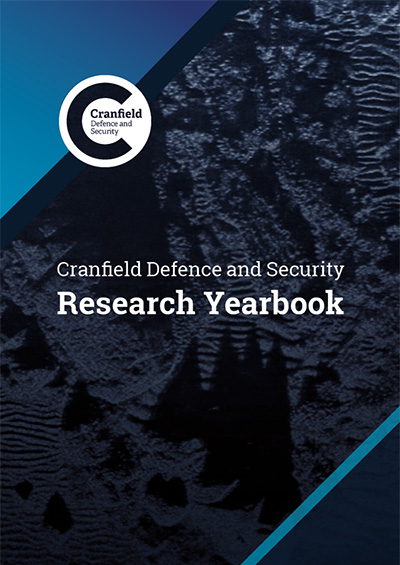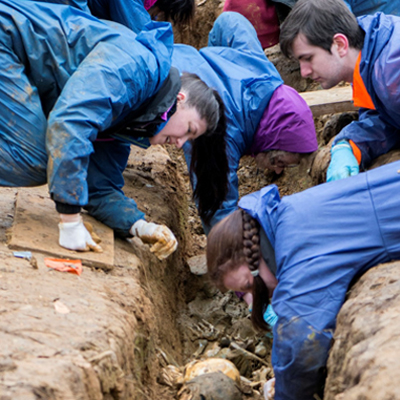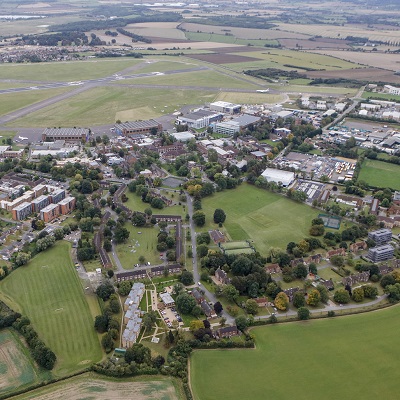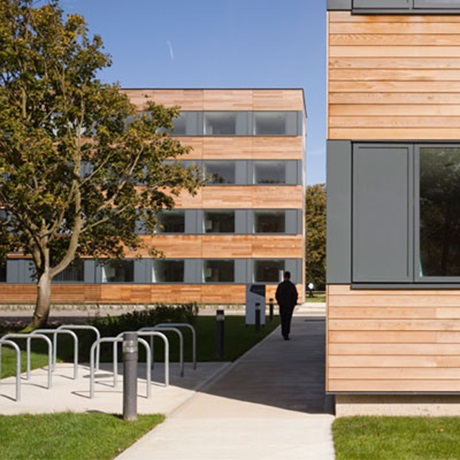Check out our Forensic Institute Merit scholarships available to students applying from around the world to study full-time on one of our Forensic masters. Also see our 40 year celebration scholarships for India or Mexico.
In partnership with the British Council and the GREAT Britain Campaign, Cranfield University is offering 5 scholarships of £10,000 to students in Bangladesh, Thailand, Vietnam, Kenya and India applying for postgraduate courses on selected Full time MSc courses.
We are delighted that Airbus have partnered with Cranfield University to offer a bursary of €3,000 to an applicant to Cranfield University and Cranfield University at Shrivenham located on the Defence Academy of the United Kingdom. Find out more
Elements of some modules as part of the course structure for this MSc will be undertaken at Cranfield University at Shrivenham located on the Defence Academy of the United Kingdom. Security clearance will be required for completion of these modules. Please refer to our entry requirements section for more details, or see further about security clearance for Cranfield at Shrivenham.
Overview
- Start dateOctober
- DurationMSc: 11 months full-time, up to three years part-time; PgDip/PgCert: up to 11 months full-time, up to two years part-time
- DeliveryBy written and practical examinations, continuous assessment, project presentation and viva voce
- QualificationMSc, PgDip, PgCert
- Study typeFull-time / Part-time
- CampusCranfield campus
Who is it for?
The course offers students a wide range of different experiences with unique facilities available to no other university in the UK.
Places on the MSc Forensic Investigation course are competitive. Students come from a wide range of backgrounds, usually with a science or forensic science first degree. Many students come from abroad, especially Europe, Africa and North America.Why this course?
The Forensic Investigation course is part of the Forensic MSc Programme and is highly practical and hands-on, aiming to produce forensic experts capable of giving expert witness testimonies in a courtroom situation and elsewhere.
Students are able to choose from a wide range of subject areas, providing a highly flexible course where learners are able to tailor their MSc to their interests.
The course consists of a short period of introductory studies followed by academic instruction in modular form. Most modules are of five days' duration, interspersed with weeks devoted to private study. Students are required to take five core modules and choose six elective modules based on their particular background, future requirements or interests. This is followed by a four-month research project and either a thesis or literature review and paper.
Informed by industry
The Forensic Investigation course has been devised by academics with operational experience in forensic science and police investigation. Its graduates are highly successful at progressing into forensically-based careers.
Course details
Students are required to take five core modules and choose six elective modules based on their particular background, future requirements or interests. This is followed by a four-month research project and thesis.
Some modules for this MSc may be taught at Cranfield University at Shrivenham.Course delivery
By written and practical examinations, continuous assessment, project presentation and viva voce
Individual project
The individual project takes four months from April to July. The student selects from a range of titles, or may propose their own topic. Most are practically or experimentally based using Cranfield’s unique facilities.
Modules
Keeping our courses up-to-date and current requires constant innovation and change. The modules we offer reflect the needs of business and industry and the research interests of our staff and, as a result, may change or be withdrawn due to research developments, legislation changes or for a variety of other reasons. Changes may also be designed to improve the student learning experience or to respond to feedback from students, external examiners, accreditation bodies and industrial advisory panels.
To give you a taster, we have listed the compulsory and elective (where applicable) modules which are currently affiliated with this course. All modules are indicative only, and may be subject to change for your year of entry.
Course modules
Compulsory modules
All the modules in the following list need to be taken as part of this course.
Introductory Studies
| Module Leader |
|
|---|---|
| Aim |
|
| Syllabus |
The emphasis in Introductory Studies is on fundamentals and subjects are covered at first-degree level. Topics include: |
| Intended learning outcomes |
Introductory Studies is designed to enable students to revise, consolidate and expand their skill and knowledge base so that they can derive maximum benefit from the course. On successful completion of this module you will be able to:
|
Investigation and Evidence Collection
| Module Leader |
|
|---|---|
| Aim |
|
| Syllabus |
|
| Intended learning outcomes |
On successful completion of this module you will be able to:
|
Reasoning for Forensic Science
| Module Leader |
|
|---|---|
| Aim |
To provide an understanding and experience of the disciplines underpinning critical evaluation of quantitative information applied within the Forensic Sciences. |
| Syllabus |
The syllabus will follow the general course of a generic investigative process from the appropriate framing of a question to the critical interpretation of data and information. The appropriate use of data in well-constructed arguments will be considered in order to distinguish between fact, opinion and speculation. Intellectual rigour will be challenged, and the ability to identify weakness in argument will be developed. Data will be examined for reliability and reproducibility with a focus on the distinct features of forensically related data. Appropriate use of descriptive and hypothesis testing statistics will be practiced and the ‘prosecutor’s fallacy’ explored. Bayes’ Theorem will be considered and rehearsed through case studies. |
| Intended learning outcomes |
On successful completion of this module you will be able to:
|
Analytical Techniques
| Module Leader |
|
|---|---|
| Aim |
To provide an understanding of the principles and practical applications of the major analytical techniques used in materials based investigations.
|
| Syllabus |
|
| Intended learning outcomes |
On successful completion of this module you will be able to:
|
Courtroom Skills
| Aim |
The module will provide an understanding of the role and responsibilities of expert witnesses in domestic and international criminal and civil cases and how they can present their evidence to the court effectively. You will also apply knowledge gained in previous modules to strengthen arguments presented in expert witness reports. |
|---|---|
| Syllabus |
|
| Intended learning outcomes |
On successful completion of this module you will be able to:
|
Advanced Crime Scene Investigation
| Module Leader |
|
|---|---|
| Aim |
The aim of this module is to further students' understanding of the core responsibilities of evidence recording and collection at the crime scene. To develop a deep understanding of the role of a CSI across a range of scenes. |
| Syllabus |
|
| Intended learning outcomes |
On successful completion of this module you will be able to:
|
Thesis Research Project
| Module Leader |
|
|---|---|
| Aim |
|
| Syllabus |
|
| Intended learning outcomes |
On successful completion of this module you will be able to:
|
Elective modules
Six of the modules from the following list need to be taken as part of this course.
Forensic Investigation of Explosives and Explosive Devices
| Module Leader |
|
|---|---|
| Aim |
|
| Syllabus |
|
| Intended learning outcomes |
On successful completion of this module you will be able to:
|
Trace Evidence
| Module Leader |
|
|---|---|
| Aim |
|
| Syllabus |
|
| Intended learning outcomes |
On successful completion of this module you will be able to:
|
Introduction to Firearms Investigations and Forensic Ballistics
| Aim |
The module shall provide an introduction to the principles of forensic investigations involving firearms and forensic investigations of projectile ballistics. |
|---|---|
| Syllabus |
|
| Intended learning outcomes |
On successful completion of this module you will be able to:
|
Forensic Archaeology: Recovering Buried Remains
| Module Leader |
|
|---|---|
| Aim |
To introduce the role of the forensic archaeologist within the context of major crime investigation, specifically in the UK. The module aims to describe and discuss all aspects of this role, including project design, wide area search techniques, grave location techniques, excavation, evidence recognition and handling, grave and scatter scene interpretation and the production of specialist reports for court. |
| Syllabus |
|
| Intended learning outcomes |
On successful completion of this module you will be able to:
|
Forensic Archaeology: Mass Grave Excavation
| Module Leader |
|
|---|---|
| Aim |
The module will introduce the principles of mass grave investigations; from finding and assessing sites, setting up and carrying out mass grave excavations to analysing and interpreting graves, victims and associated evidence. |
| Syllabus |
Day 1: Classroom based teaching Day 2: Site assessment and setup Day 3-6: Site excavation Day 7: Site closure and exercise debrief
The seven days include: |
| Intended learning outcomes |
On successful completion of this module you will be able to:
|
Fundamentals of Forensic Anthropology: Osteology
| Module Leader |
|
|---|---|
| Aim |
To provide a broad introduction to the subject, focusing on the role of the forensic anthropologist, human skeletal anatomy and the basic biological profile from human skeletal remains. |
| Syllabus |
Day 1: Introduction to human skeletal anatomy, biomechanics, and forensic anthropology. Day 2: Bone and tooth identification and taphonomy. Day 3: Human vs non-human bone. Day 4: Biological profile estimation (age-at-death, sex, stature, ancestry). Day 5: Analysis of a human skeleton. |
| Intended learning outcomes |
On successful completion of this module you will be able to:
|
Practical Archaeological Excavation
| Module Leader |
|
|---|---|
| Aim |
To provide you with an understanding of the manner in which traditional archaeology uses field techniques to address practical research questions.
|
| Syllabus |
|
| Intended learning outcomes |
On successful completion of this module you will be able to:
|
Mass Fatality Incidents
| Module Leader |
|
|---|---|
| Aim |
This course provides an introduction to mass fatality incidents (MFI); their definition, categorisation, mitigation and management. It has a strong focus on disaster victim identification (DVI) but also covers more general effects, challenges, lessons learnt, management developments and, the return to normality following an MFI. In particular, the course considers the roles and responsibilities of the personnel involved in the DVI process, practical application of Interpol guidelines and DVI forms, planning and evaluation of temporary mortuary facilities and, DVI humanitarian assistance aspects of mass fatality incident response. The course may be of interest to a wide range of professionals including; emergency planners, emergency response personnel (police, fire and ambulance), family liaison officers, accident investigators, NGO workers, forensic scientists, medical doctors, lawyers, and those involved in the investigation of missing persons. |
| Syllabus |
|
| Intended learning outcomes |
On successful completion of this module you will be able to:
|
Radiographic Investigations in Forensic Science
| Module Leader |
|
|---|---|
| Aim |
To provide an understanding of the principles and practical applications of radiographic imaging techniques used in forensic science. |
| Syllabus |
|
| Intended learning outcomes |
On successful completion of the module you will be able to:
|
Hazardous Forensics
| Module Leader |
|
|---|---|
| Aim |
To present the fundamental principles of hazardous investigations including CBRN and to introduce techniques and working practices that promote risk management during a methodical investigation. |
| Syllabus |
|
| Intended learning outcomes |
On successful completion of this module you will be able to:
|
Forensic Exploitation and Intelligence
| Module Leader |
|
|---|---|
| Aim |
To provide an understanding of the principles and practical applications of the major forensic analytical techniques used in Forensic Intelligence (FORINT) and exploitation. |
| Syllabus |
|
| Intended learning outcomes |
On successful completion of this module you will be able to:
|
Forensic Ecology
| Module Leader |
|
|---|---|
| Aim |
The module will provide an understanding of the contribution of environmental evidence in a forensic investigation and how analytical sciences can help the investigation of crimes against the environment. |
| Syllabus |
|
| Intended learning outcomes |
On successful completion of the module you will be able to:
|
Trauma Weapon Effects
| Module Leader |
|
|---|---|
| Aim |
Understand the nature of different weapon types used in criminal activity. Evaluate the construction of improvised weapons and their wounding potential in real life scenarios. |
| Syllabus |
|
| Intended learning outcomes |
On successful completion of this module you will be able to:
|
Fundamentals of Fire Investigation
| Aim |
Understand the nature of fire, its basic principles, and the application of fire investigation in the criminal and civil judicial process. Appreciate the application of fire investigation skills in real world applications and investigations. |
|---|---|
| Syllabus |
|
| Intended learning outcomes |
On successful completion of this module you will be able to:
|
Digital Scene Forensics
| Module Leader |
|
|---|---|
| Aim |
This module considers the development and growing importance of digital evidence encountered on the crime scene. It looks in detail at a breadth of digital evidence hosts, including carried and worn devices, ‘the internet of things’ in the home and workspace, mobile location devices and digital CCTV. It considers how such things have altered the balance between novel and traditional forensic examination strategies. The series of workshops grouped under Operation Yellow Caiman give participants the opportunity to engage directly with a range of these technologies and understand first hand the nature of the data derived from them. |
| Syllabus |
|
| Intended learning outcomes |
On successful completion of this module you will be able to:
|
DNA
| Module Leader |
|
|---|---|
| Aim |
|
| Syllabus |
|
| Intended learning outcomes |
On successful completion of this module you will be able to:
|
Bloodstain Pattern Analysis
| Module Leader |
|
|---|---|
| Aim |
|
| Syllabus |
|
| Intended learning outcomes |
On successful completion of this module you will be able to:
|
Temporary Mortuary Operations
| Module Leader |
|
|---|---|
| Aim |
|
| Syllabus |
|
| Intended learning outcomes |
On successful completion of this module you will be able to:
|
Forensic Imaging
| Module Leader |
|
|---|---|
| Aim |
|
| Syllabus |
|
| Intended learning outcomes |
On successful completion of this module you will be able to:
|
Investigating Threats to Cultural Heritage
| Aim |
To investigate heritage crime and appraise the methods and agencies that combat it. |
|---|---|
| Syllabus |
|
| Intended learning outcomes |
On successful completion of the module you will be able to:
|
Teaching team
You will be taught by Cranfield's leading experts with capability expertise, industry knowledge and collective subject research, as well as external speakers from industry and defence. The Course Director is Hannah Allen. The teaching team includes:
Your career
The Forensic Investigation course offers career opportunities across a broad range of applications. Past students have gone on to work in forensic laboratories, government bodies and police forces.
Cranfield Careers and Employability Service
Cranfield’s Careers and Employability Service is dedicated to helping you meet your career aspirations. You will have access to career coaching and advice, CV development, interview practice, access to hundreds of available jobs via our Symplicity platform and opportunities to meet recruiting employers at our careers fairs. We will also work with you to identify suitable opportunities and support you in the job application process for up to three years after graduation.
How to apply
Click on the ‘Apply now’ button below to start your online application.
See our Application guide for information on our application process and entry requirements.




















